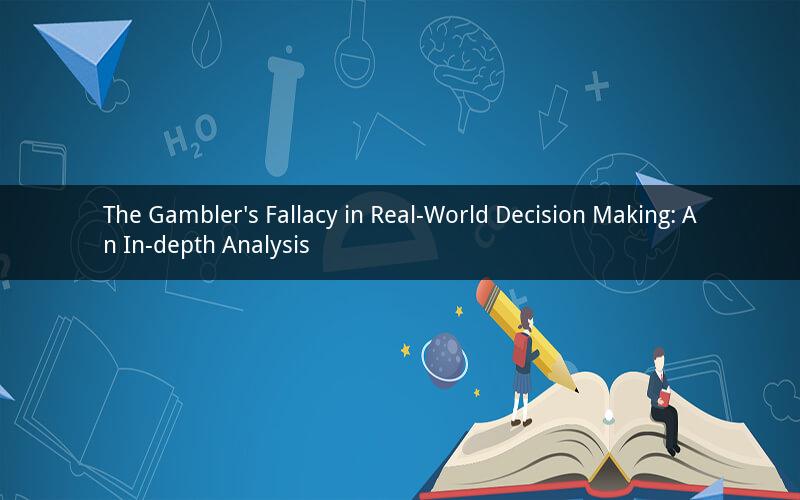
The gambler's fallacy is a cognitive bias that affects decision-making in various real-world scenarios. It occurs when individuals believe that a random event is more or less likely to occur based on previous outcomes. This fallacy has been widely discussed in the field of psychology and decision science, as it can lead to irrational decisions and negative consequences. In this article, we will explore the presence of the gambler's fallacy in real-world decision-making and its implications.
1. Introduction to the Gambler's Fallacy
The gambler's fallacy is rooted in the misconception that random events are influenced by previous outcomes. For instance, if a coin has landed on heads ten times in a row, some individuals might believe that the next toss is more likely to result in tails. This belief is incorrect because each coin toss is an independent event, and the previous outcomes do not affect the probability of future outcomes.
2. The Gambler's Fallacy in Financial Markets
The gambler's fallacy is often observed in financial markets, where investors make decisions based on recent trends and historical data. For example, if a stock has been rising for several days, some investors might believe that it is more likely to fall in the near future. This belief is a classic example of the gambler's fallacy, as the stock's future performance is not influenced by its past performance.
3. The Gambler's Fallacy in Sports Betting
Sports betting is another area where the gambler's fallacy is prevalent. Bettors often believe that a team that has lost multiple games in a row is more likely to win its next game. This belief is incorrect because each game is an independent event, and the team's past performance does not guarantee its future success.
4. The Gambler's Fallacy in Everyday Life
The gambler's fallacy can also affect decision-making in everyday life. For instance, if a person has received a series of positive responses to their job applications, they might believe that their next application is less likely to be successful. This belief is a manifestation of the gambler's fallacy, as the probability of receiving a positive response is not influenced by previous outcomes.
5. The Implications of the Gambler's Fallacy
The gambler's fallacy can have significant implications for decision-making in various domains. It can lead to irrational decisions, financial losses, and emotional distress. By recognizing the presence of the gambler's fallacy, individuals can make more informed and rational decisions.
6. Strategies to Overcome the Gambler's Fallacy
To overcome the gambler's fallacy, individuals can adopt several strategies:
a. Emphasize the independence of events: Remind yourself that each event is independent of previous outcomes.
b. Seek expert advice: Consult with professionals who can provide objective insights and guidance.
c. Educate yourself: Learn about the principles of probability and the nature of random events.
d. Practice mindfulness: Be present in the moment and avoid overthinking the past.
e. Develop critical thinking skills: Analyze information objectively and avoid making assumptions based on previous outcomes.
7. Conclusion
The gambler's fallacy is a cognitive bias that can affect decision-making in various real-world scenarios. By understanding its presence and implications, individuals can make more informed and rational decisions. By adopting strategies to overcome this fallacy, individuals can improve their decision-making abilities and minimize the negative consequences associated with it.
Questions and Answers:
1. What is the gambler's fallacy?
Answer: The gambler's fallacy is a cognitive bias that occurs when individuals believe that a random event is more or less likely to occur based on previous outcomes.
2. How does the gambler's fallacy affect financial markets?
Answer: The gambler's fallacy can lead investors to make irrational decisions based on recent trends and historical data, which can result in financial losses.
3. Can the gambler's fallacy be overcome?
Answer: Yes, individuals can overcome the gambler's fallacy by emphasizing the independence of events, seeking expert advice, educating themselves, practicing mindfulness, and developing critical thinking skills.
4. Is the gambler's fallacy more prevalent in certain industries?
Answer: The gambler's fallacy is prevalent across various industries, including financial markets, sports betting, and everyday life decisions.
5. How can recognizing the gambler's fallacy benefit individuals?
Answer: Recognizing the gambler's fallacy can help individuals make more informed and rational decisions, reduce the risk of financial losses, and improve their overall well-being.